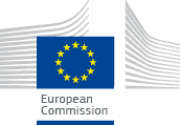
Three years ago, the Commission launched the Just Transition Mechanism (JTM) to support EU regions most affected by the green transition. As the implementation phase is now underway, it is time to examine the progress made so far and consider the complementarities between the three JTM pillars. This panel will bring together experts, policy makers and activists involved in the just transition. Join us for a discussion on the opportunities and challenges of the JTM.
- Territorial | Urban | Rural | Local and regional | Energy | Sustainable | Mobility and Transport | Governance and Public administration | Demographics (depopulation and ageing) | Jobs and Employment | Research and Innovation
- Code: 10WS2379
Practical information
- When
-
Tue 10/10/2023, 14:30 - 15:30 CET
- Type of partnership
- NONE
- Format
- Workshop
- Theme
-
Regions in post-industrial transition
- Language
- English
Partner

Reporting
Session summary
• DG REGIO launched the Just Transition Mechanism (JTM) under the European Green Deal to ensure that regions most impacted by the green transition receive adequate support.
• Luis Rodriguez Hebrero, Head of Division at the EIB highlighted the challenges associated with the tight implementation schedule of the JTM and emphasized the efforts made by available advisory services to distinguish between less mature and more advanced projects, aiming to expedite implementation. Mr Hebrero mentioned that projects across all three Pillars were in the pipeline, sharing specific examples from various Member States. The EIB encouraged the audience to reach out to JASPERS (for Pillar I) and the InvestEU Advisory Hub (for Pillars II and III) to explore opportunities for accessing available advisory and financing under the JTM Pillars.
• Miloslawa Stepien, Just Transition Coordinator at the CEE Bankwatch positioned the JTM as an invaluable tool at the EU level, catering to the needs of transitioning regions. Emphasizing the ambitious trajectory of the JTM/JTF, the speaker acknowledged challenges such as brain drain and the scarcity of a skilled workforce. The speaker highlighted how the JTM/JTF facilitated enhanced participation at various levels, fostering capacity building and rejuvenating regions, particularly in terms of skilled labor. However, the implementation of JTF poses significant challenges, especially for regions with limited administrative and financial capacities, underscored by brain drain. MS Stepien from the Bankwatch also drew attention to financial barriers faced by smaller stakeholders in accessing Pillars II and III, underscoring the dire need for increased support. Notable initiatives such as the Just Transition Platform (JTP) and JTF groundwork were cited as successful models in this context.
• Zdenek Karasek, the Councilor of Moravia-Silesia region, elaborated on the role of JTF in the Czech Republic's transition process, highlighting the success of the national-level implementation of JTF in close collaboration with the regions. Notably, the Czech Republic was among the pioneering EU Member States to endorse a Territorial Just Transition Plan, with significant emphasis placed on youth involvement. The structure of the Czech Republic's Territorial Just Transition Plan was discussed, outlining the allocation of JTM resources into strategic projects, umbrella projects, thematic calls, and financial instruments. Regarding Pillar III, the Councilor disclosed that the Czech Republic had applied for funding for the Ostrava Concert Hall, currently undergoing reassessment by the EC. Additionally, another project in the pipeline for Pillar III was the T-Park. Concluding the discussion, the Councilor emphasized that the JTM/JTF had facilitated the development of transitioning regions in the Czech Republic while making the benefits of EU funds more visible.
• (Q&A) The panel deliberated on the complexity arising from multiple EU funds targeting different, occasionally overlapping objectives. The role of the EC and the EIB in providing guidance and transparent information on how EU funds operate was highlighted as crucial in navigating this complexity.
• (Q&A) The panel engaged in a discourse on the intensive efforts required at various levels, including education, workforce, and infrastructure, to foster entrepreneurship in former mining regions. In many areas, the establishment of entrepreneurship was deemed essential.
• (Q&A) One of participants shared the challenges faced by a local community in Eeklo, Belgium, in executing its plans with a private sector partner. The participant was advised to seek legal counsel.



